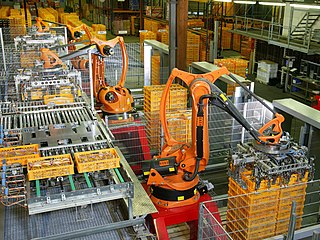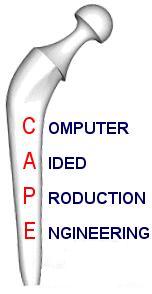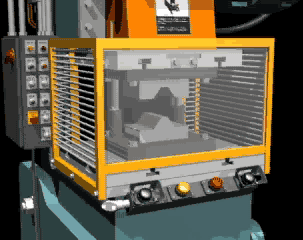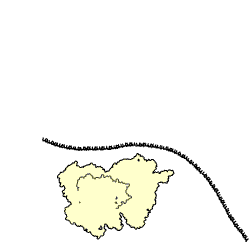
Systems engineering is an interdisciplinary field of engineering and engineering management that focuses on how to design, integrate, and manage complex systems over their life cycles. At its core, systems engineering utilizes systems thinking principles to organize this body of knowledge. The individual outcome of such efforts, an engineered system, can be defined as a combination of components that work in synergy to collectively perform a useful function.

In industry, product lifecycle management (PLM) is the process of managing the entire lifecycle of a product from its inception through the engineering, design, and manufacture, as well as the service and disposal of manufactured products. PLM integrates people, data, processes and business systems and provides a product information backbone for companies and their extended enterprise.
Process engineering is the understanding and application of the fundamental principles and laws of nature that allow humans to transform raw material and energy into products that are useful to society, at an industrial level. By taking advantage of the driving forces of nature such as pressure, temperature and concentration gradients, as well as the law of conservation of mass, process engineers can develop methods to synthesize and purify large quantities of desired chemical products. Process engineering focuses on the design, operation, control, optimization and intensification of chemical, physical, and biological processes. Process engineering encompasses a vast range of industries, such as agriculture, automotive, biotechnical, chemical, food, material development, mining, nuclear, petrochemical, pharmaceutical, and software development. The application of systematic computer-based methods to process engineering is "process systems engineering".

University of Bío-Bío is a university in Chile. It is part of the Chilean Traditional Universities.

Food engineering is a scientific, academic, and professional field that interprets and applies principles of engineering, science, and mathematics to food manufacturing and operations, including the processing, production, handling, storage, conservation, control, packaging and distribution of food products. Given its reliance on food science and broader engineering disciplines such as electrical, mechanical, civil, chemical, industrial and agricultural engineering, food engineering is considered a multidisciplinary and narrow field. Due to the complex nature of food materials, food engineering also combines the study of more specific chemical and physical concepts such as biochemistry, microbiology, food chemistry, thermodynamics, transport phenomena, rheology, and heat transfer. Food engineers apply this knowledge to the cost-effective design, production, and commercialization of sustainable, safe, nutritious, healthy, appealing, affordable and high-quality ingredients and foods, as well as to the development of food systems, machinery, and instrumentation.
Alagappa College of Technology is an educational institution located in Chennai, Tamil Nadu, India that offers higher education in engineering, technology and allied sciences. The college was established in 1944 and was integrated with Anna University in 1978 from University of Madras as a constituent part of Anna University.

Computer-aided production engineering (CAPE) is a relatively new and significant branch of engineering. Global manufacturing has changed the environment in which goods are produced. Meanwhile, the rapid development of electronics and communication technologies has required design and manufacturing to keep pace.

Stamping is the process of placing flat sheet metal in either blank or coil form into a stamping press where a tool and die surface forms the metal into a net shape. Stamping includes a variety of sheet-metal forming manufacturing processes, such as punching using a machine press or stamping press, blanking, embossing, bending, flanging, and coining. This could be a single stage operation where every stroke of the press produces the desired form on the sheet metal part, or could occur through a series of stages. The process is usually carried out on sheet metal, but can also be used on other materials, such as polystyrene. Progressive dies are commonly fed from a coil of steel, coil reel for unwinding of coil to a straightener to level the coil and then into a feeder which advances the material into the press and die at a predetermined feed length. Depending on part complexity, the number of stations in the die can be determined.

Biological engineering or bioengineering is the application of principles of biology and the tools of engineering to create usable, tangible, economically-viable products. Biological engineering employs knowledge and expertise from a number of pure and applied sciences, such as mass and heat transfer, kinetics, biocatalysts, biomechanics, bioinformatics, separation and purification processes, bioreactor design, surface science, fluid mechanics, thermodynamics, and polymer science. It is used in the design of medical devices, diagnostic equipment, biocompatible materials, renewable energy, ecological engineering, agricultural engineering, process engineering and catalysis, and other areas that improve the living standards of societies.
The following outline is provided as an overview of and topical guide to technology: collection of tools, including machinery, modifications, arrangements and procedures used by humans. Engineering is the discipline that seeks to study and design new technology. Technologies significantly affect human as well as other animal species' ability to control and adapt to their natural environments.
Biomolecular engineering is the application of engineering principles and practices to the purposeful manipulation of molecules of biological origin. Biomolecular engineers integrate knowledge of biological processes with the core knowledge of chemical engineering in order to focus on molecular level solutions to issues and problems in the life sciences related to the environment, agriculture, energy, industry, food production, biotechnology and medicine.
The CSIR-National Environmental Engineering Research Institute (CSIR-NEERI) is a research institute created and funded by Government of India. It was established in Nagpur in 1958 with focus on water supply, sewage disposal, communicable diseases and to some extent on industrial pollution and occupational diseases found common in post-independent India. NEERI is a pioneer laboratory in the field of environmental science and engineering and part of Council of Scientific and Industrial Research (CSIR). NEERI has five zonal laboratories at Chennai, Delhi, Hyderabad, Kolkata and Mumbai. NEERI falls under the Ministry of Science and Technology (India) of central government. The NEERI is an important partner organisation in India's POPs national implementation plan (NIP).
AutoForm Engineering GmbH located in Wilen bei Wollerau is a Swiss software developer. The company develops and markets software products for the die making and sheet metal forming industry. This covers product manufacturability, tool and material cost calculation, die face design and virtual process optimization. In this field the company had in 2009 a market share of 50 to 60 percent, and in 2008 of the largest 20 automotive OEMs and most of their suppliers were using AutoForm.

Industrial engineering is an engineering profession that is concerned with the optimization of complex processes, systems, or organizations by developing, improving and implementing integrated systems of people, money, knowledge, information and equipment.
FlexSim is a discrete-event simulation software package developed by FlexSim Software Products, Inc. The FlexSim product family currently includes the general purpose FlexSim product and healthcare systems modeling environment.
The Cluster of Excellence Integrative Production Technology for High-Wage Countries is an interdisciplinary research project of RWTH Aachen University combined in the “Aachen House of Integrative Production”. It pursues the long-term goal to increase the competitiveness of German manufacturing technology. The Cluster of Excellence was founded in October 2006 as part of the Excellence Initiative of the German Federal Ministry of Education and Research and the German Research Foundation. It was re-announced as a Cluster of Excellence on June 15, 2012.

The North East of England Process Industry Cluster (NEPIC) is an economic cluster created following the industrial cluster ideas and strategy of Michael Porter. This Process Industry Cluster has been created by the chemistry using industries based in North East England where more than 1,400 companies are based in the supply chain of the sector. The sector has over 35,000 direct employees and some 190,000 indirect employees in the northeast of England and together they represent over one third of the industrial economy of the region. Companies in the Cluster manufacture 50% of the UK's Petrochemicals and 35% of the UK's Pharmaceuticals and they significantly contribute towards making the region the only net exporting region of the UK. The region has over £13 billion of exports.
Industrial and production engineering (IPE) is an interdisciplinary engineering discipline that includes manufacturing technology, engineering sciences, management science, and optimization of complex processes, systems, or organizations. It is concerned with the understanding and application of engineering procedures in manufacturing processes and production methods. Industrial engineering dates back all the way to the industrial revolution, initiated in 1700s by Sir Adam Smith, Henry Ford, Eli Whitney, Frank Gilbreth and Lilian Gilbreth, Henry Gantt, F.W. Taylor, etc. After the 1970s, industrial and production engineering developed worldwide and started to widely use automation and robotics. Industrial and production engineering includes three areas: Mechanical engineering, industrial engineering, and management science.
Professor Peter Gray is a bioengineer who has played a key role in the development of modern industrial biotechnology in Australia. He was Professor and Head of Biotechnology at the University of New South Wales (UNSW), Sydney, from 1988 – 2003, and was the inaugural Director of the Australian Institute for Bioengineering and Nanotechnology (AIBN) at The University of Queensland in Brisbane, Australia from 2003 – 2015.
The Barcelona School of Agri-Food and Biosystems Engineering (EEABB) is a university center founded in 1912. EEABB is nowadays an engineering school of the UPC-BarcelonaTech offering bachelor's and master's degrees in the field of Biosystems engineering.








